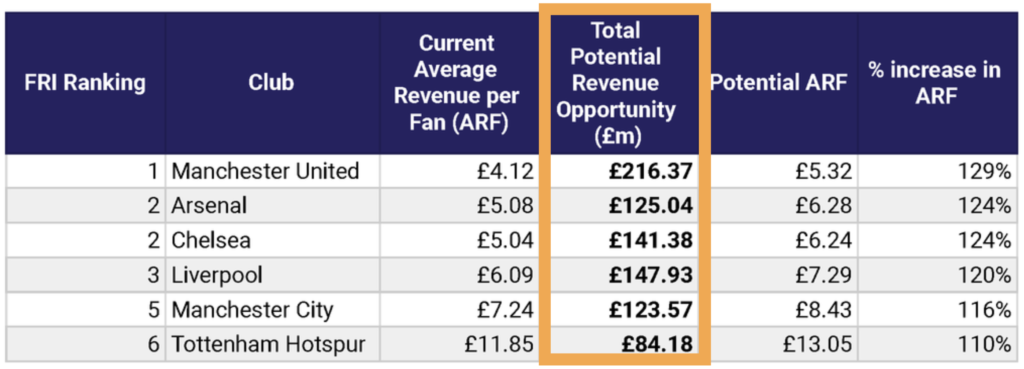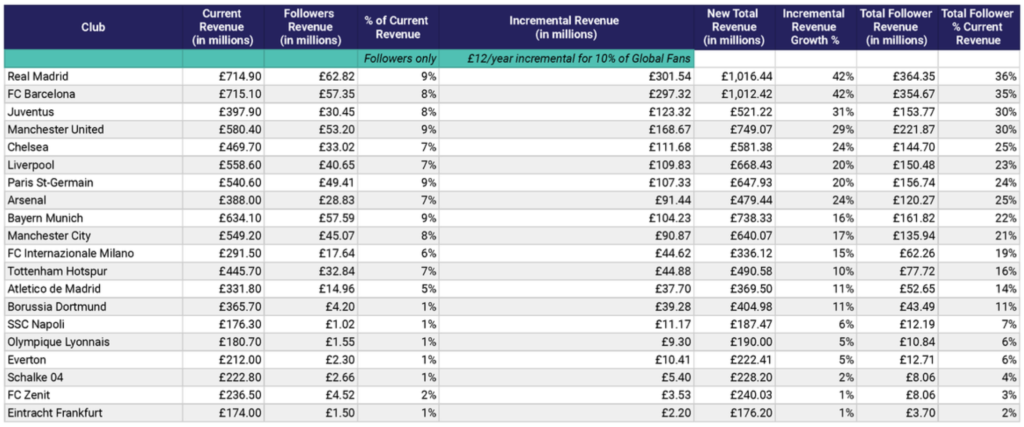June 16 – A new survey released this week suggests that the Big 6 clubs who pursued new European Super League (ESL) riches should be looking closer to home for a significant and less stressful push for more money.
New analysis of the economic value of leading clubs’ fanbases and the size of their opportunity to increase revenues by delivering better value to existing fans could unlock as much as £838 million in new revenue. Manchester United could unlock a £216m revenue windfall alone.
The Fan Relationship Index (FRI), developed by the CLV Group, looks at publicly-available revenue, social media and match attendance data as well as specially-commissioned surveys of football fans in the UK, USA and Indonesia to rank the Premier League top clubs.
Man Utd tops the ranking of Big Six clubs with a 129% increase in Average Revenue per Fan. Arsenal is next on the table with a potential 124% increase in potential revenue (worth £125 million), while Liverpool has the second-highest total potential revenue opportunity at just under £148 million.
The CLV Group point out thatfive of the top sixEnglish clubs have significant incremental opportunities of more than £120 million – more than double the current Champions League starting earnings of £50 million.
The flip side of the clubs chasing the opportunity of the ESL is that in doing so they have damaged their own income streams. The report suggests that if the Big 6 English clubs continue to alienate their core local fans in the UK the impact could be a much as a 10% hit in revenues – about £221 million in total.
What will be of particular concern to club commercial managers is that the report found 37% of Bix Six fans saying the ESL fiasco has reduced their trust in their club, and that they planned to spend less on merchandise (23%) and match attendance (21%) as a result.
Neil Joyce, CEO and Co-Founder of The CLV Group: “Clubs have become over-reliant on a small number of revenue sources, such as media and sponsorship deals, and the Champions League – leading to fans feeling disenfranchised and exploited. This report is designed to help clubs to avoid future errors and identify new revenue streams that acknowledge the importance of keeping their most loyal fans happy and engaged.”
According to the report, Fanatics (loyal fans who attend at least 10 games per season) contribute an average of 21-30% of current club revenue: a fanatical Manchester United fan spends 654 times more than an average fan does with the club, with Chelsea’s Fanatics not far behind.
The report finds that if the Big Six could convert 10% of their global fans to spend an extra £1 per month, it would equate to more than £600 million in incremental direct revenue – £168m million for Manchester United alone.
Joyce says that clubs need to generate ‘actionable data’ about their fanbases to enable them to make the right decisions. “Ultimately, the benchmark for garnering actionable data is creating a value exchange with a fan via a membership account on the club’s private platform,” says Joyce. “This is both privacy compliant and gives back relevant value to fans in exchange for full, 100 per cent engagement, interest and transactional data, delivering the best approach for clubs looking to extract meaningful insight.”
Download the full report here.
Contact the writer of this story at moc.l1714626699labto1714626699ofdlr1714626699owedi1714626699sni@n1714626699osloh1714626699cin.l1714626699uap1714626699


